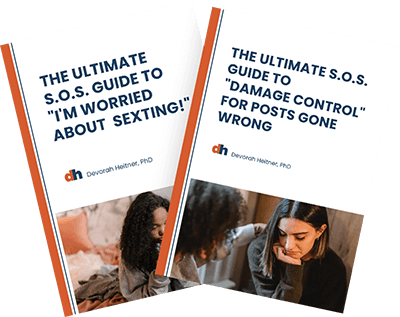It seems that online video stardom has replaced big-screen fame as a goal for young kids. And unlike making it big in Hollywood, becoming a YouTube star seems more accessible, because the platform is open to anyone. So it’s no surprise that many parents and teachers are telling me their kids and students are asking to create their own YouTube channels or TikTok in the hopes of becoming famous.
Many parents ask me questions about their kids putting themselves out there on YouTube (or TikTok.) While scrolling these mega-platforms brings up one set of questions, posting requires a whole new level of thought.
▪ About your kid now.
▪ About your kid in the future as a self-conscious teen.
▪ About your child as a young adult looking for a job.
The decision to let your child join any social-media platform is, of course, a personal one and depends on the child’s age, emotional maturity and reasons for wanting to put themselves out there. Before allowing a child to head down that path, here are some questions parents can ask:
What kinds of videos do you want to create?
What are your favorite channels/influencers?
What do you like about them?
Are there any channels you DON’T like?
What don’t you like about them?
Approach the conversation with curiosity and without judgment, and explore accounts with your child to see why they might be interested in creating a YouTube channel or TikTok.
If you decide to allow your child to post on these searchable platforms, or if your teen is doing it already, here are some ways to make the experience safer, and more enjoyable.
Create a plan
Have the child write a proposal outlining what they want for the channel. It should describe what they’ll offer, the target audience and how often they will post videos. If they are looking at the channel as a business, ask them what kinds of advertising they might consider and whether endorsements are a good idea.

Talk about fame
Some kids want to be famous and see TikTok or YouTube as the path to recognition. Kids hear that they can get super famous, and make lots of money, but that’s the exception and not an outcome your child should count on. They might see a kid star performing cool skateboard stunts on their tablet screen and want to be just like them. Talk to your child about the difference between achieving fame in the numerical sense (likes and shares) vs. the satisfaction that comes with making friends smile. You can also help your child recognize that fame might not be a worthy goal for a kid. Maybe your child wants to be known in your community, whether for being great at a particular school subject or in sports or doing community service. But teach them that it can also be satisfying — and a lot less stressful — to do amazing things and be known to only a small number of people.
Pursuing fame in a numerical sense can put unnecessary pressure on kids. For kids who have “gone viral,” the experience definitely changes their lives in ways they can’t take back.
What parents should do instead of worrying that smartphones will ‘destroy’ their kids
The more vulnerable your child is on that front, the more prudent it is to wait, and to help them find other ways to share and express themselves in the meantime, such as performing in a play or even TEDx Youth. Yes, their TEDx will be on YouTube, but it’s a one-time talk that they’ll rehearse and share in a specific context. Maintaining a channel and having to come up with new material is a much more challenging situation for some young people (and even adults who maintain active channels) to deal with.
Older teenagers might want to watch famous YouTuber Daniel Howell’s moving video “Why I Quit YouTube.”
Discuss content
Be clear with your child about what’s okay to post, what should stay private and other aspects of staying safe online and being respectful of both their own privacy and the privacy of others. As with any form of social media, we need to help our kids understand what to share and what not to share online. Some things to be conscious of keeping private include where they go to school or what sports teams they play for; the names of family members, friends, teachers or caretakers; and information about their age and day-to-day whereabouts.
Launch with training wheels
Just as I recommend when giving a child their first phone, offer them “training wheels.” Review all of their videos before they are posted, and discuss the potential risks of what they’re sharing. Consider having all videos listed as private, and only sharing them with your immediate family and close friends. Or create a family account and share it with only a select audience of friends and family members. By starting out with privacy settings and a more limited audience of trusted friends and family, your child can ask for constructive feedback on what’s working well.
Turn off comments
There are people out there with too much time on their hands, and the trolls who post negative comments on YouTube could make your child feel bad. Your 10-year-old does not need hateful comments on his magic tricks channel. For elementary school-age kids, the feedback you can receive on a public channel isn’t helpful or authentic. Instead, it is often harmful and inappropriate. Encourage your kids to seek in-person, valuable and constructive feedback from friends and family members rather than creating space for people they don’t know to potentially insult them.
For older children, such as sturdy and secure high school students who are talking about politics on their YouTube or TikTok or sharing information about causes they care about, turning on comments may be appropriate. But even then, they’ll need a thick skin to deal with what may happen, and a plan to deal with harassment or inappropriate comments.
If your child is a little (or a lot) famous, whether it’s for a sport, for inventing something or as a young activist, they will need to be insulated from as much public negativity as possible and taught how to deal with the rest. Even under the ideal circumstances of creating a great channel with significant parental guidance, growing up in the public eye is no easy task and may have unintended consequences.
Here’s an article about how to turn off comments on Tik Tok.
Keep the conversation open
Once your child’s TikTok or YouTube channel is up, continue supporting her. Check in regularly to see whether there are any issues or conflicts popping up and how you can help. Just as with your initial conversations, approach these with an open mind so your child knows they can count on you for advice and support.
Video is a fun way for all of us to interact, and encouraging our kids to build and share videos with deliberate intention can be a good learning experience. On the other hand, maintaining a private archive of your child’s piano compositions or superhero movies can be a great way for them to engage creatively, and later, as teens or adults, they may thank you for keeping their creations in the family.

